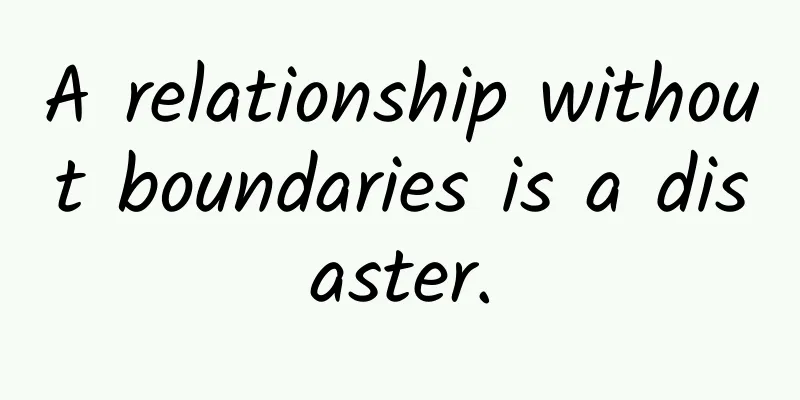A relationship without boundaries is a disaster.

|
Whether it is the controversy over the topic of "young people kissing each other", the rise of "hookup culture", or the resonance of the entire network caused by "socially anxious people", we have discovered that modern people pay more and more attention to the sense of boundaries of themselves or others, and also prefer the social method of "keeping a safe distance". So, what exactly is a sense of boundaries? How to establish a sense of boundaries? Why do some people always struggle with a sense of boundaries? Let’s talk about it today. Copyright images in the gallery. Reprinting and using them may lead to copyright disputes. What is a sense of boundaries? Boundary sense in interpersonal relationships refers to communicating with others and deciding what belongs to us, what does not belong to us, and who is responsible for what. It is important for us to know the nature, scope and ownership of things, and is related to all types of relationships and environments, including love, work, friendship, family, social, etc. Everyone starts to develop a sense of boundaries at a very young age. For example, the words "no" and "mine" that two-year-olds like to say are words that express a sense of boundaries, letting others know where you stand, how you feel, what you tolerate, and when you should back down. When a child expresses his boundaries, if people around him respect his boundary declaration, he will know how to express his position. However, if his boundaries are violated at will during his growth, such as being used as a punching bag by others, he is likely to think that he needs to be responsible for the mistakes of others and lack a sense of boundaries. Erik Erikson’s classic and timeless model of human development, the stages of psychosocial development, can help us understand how childhood experiences influence the development of a sense of boundaries: ● Basic trust vs. mistrust (birth ~ 18 months): At this stage, if babies' needs are always met by their caregivers and they are always loved and cared for, they will learn to trust. If their needs are not met or life is unpredictable, they will mistrust. ● Autonomy vs. Shame (1-3 years old): Children at this stage are in the exploration stage. If they have the freedom to try new things, they will learn independence; conversely, if they are punished or discouraged for independence, they will develop fear, shame and doubt. ● Initiative vs. Guilt (3-5 years old): This stage is largely a continuation of the previous stage. Children will make decisions more independently and confidently. This is the stage when children learn to take the initiative to try to accomplish new things, make new friends, and explore. If parents encourage their children to do this while ensuring safety, they will learn to be confident; if parents not only do not encourage, but also discourage and hinder their children's independence, they will feel guilty. ● Diligence vs. inferiority complex (6-11 years old): More social comparisons occur during this stage. Children seek evidence of their competence from the evaluations of their peers, teachers, and parents. If they do not receive recognition of their own value and ability from others, they will doubt themselves and develop inferiority complex. ● Identity vs. role confusion (12-18 years old): The main question that adolescents explore at this stage is “Who am I?” In addition, they will also struggle with their position in the world and what they will do in the future. A lot happens during this period. Teens try out a lot of ideas, and they may argue about them without even knowing why. They are working to shape their own personal beliefs, ideals, values, and goals. This stage is crucial for identity formation, and teens need to be able to try out new ideas without being judged (in a safe environment, of course). If adults don't respect their autonomy and give them enough space to work things out, they can develop a confused identity and sense of self. Copyright images in the gallery. Reprinting and using them may lead to copyright disputes. Why is a sense of boundaries important? First, we need to understand "co-dependency" A sense of boundaries can help us have a more harmonious relationship with others. Just imagine how overwhelmed we would be if we had to be responsible for other people's feelings, reactions and other messy things while living our own lives. People who struggle with boundaries almost always struggle with co-dependency, a state of overdoing things in relationships, often doing too much out of the best of intentions or because of a misunderstanding that the other person needs help, which in turn causes the other person to continue to behave badly. People who are highly codependent have a hard time knowing when and how to say no, and they have a hard time determining who is responsible for the problem at the time. Additionally, they tend to be attracted to people who want to exploit, consume, or rely on others to solve their problems. In other words, givers attract takers, and vice versa. However, the strange thing is that people with strong co-dependency always try too hard and take the initiative to help others, but on the other hand, they often complain that other people's problems bring them pressure and burden. So why does this happen again and again? Copyright images in the gallery. Reprinting and using them may lead to copyright disputes. The answer goes back to childhood—problem solvers have never learned to say no, nor have they been allowed to say no; or they may have been emotionally brainwashed by guilt and punishment, and thus lost the ability to say no. Problem-solving, while not always pleasant, is at least familiar. It satisfies a need or desire for help that some people may not realize is actually an option. People who enjoy solving other people's problems often find themselves around people who have problems. They tend to get hung up on the idea that they need or must help others. They imagine that if they don't help, something terrible and heartbreaking will happen to the other person, and they believe that they have no choice. Others solve problems because it makes them feel good, useful, or powerful. This can give people a false sense of control or power, especially when their own lives are in chaos. The most painful thing may be that they know they shouldn't try to solve it anymore and to remove themselves, but doing so feels like they are intentionally hurting others and even ruining their lives. The storyline they imagine is scary and it won't go away, but it is also flawed. It is hard to resist such a storyline. Even if it is clearly wrong and twisted, the person living in the storyline only knows this one path in life. They often don’t know there are other ways to live, and this is all they know. Perhaps no one has ever told this person that focusing on self and self-care is reasonable and beneficial, and they have most likely been taught that doing so is selfish. Here are some questions to help you better assess your level of collaborative dependency. Take the test! Collaborative dependency evaluation ● How much time do I spend focusing on other people’s problems instead of my own happiness? ● How much do I blame myself when I don’t do more to help others? ● How much responsibility do I take in helping others solve problems that are not directly related to me? ● How guilty do I feel when I can’t or don’t help others? ● How important is it to me to help others? ● How difficult is it for me to speak up and express my ideas? ● When someone asks me to do something, how hard is it to say no? ● How difficult is it for me to spend time on myself? ● How bothered am I by making others sad? ● How much time do I spend apologizing for not doing more? ● How much of my own happiness have I given up for others? ● How important is it to me to have the approval of others? The more times you answer "very often", the harder it is to get rid of co-dependency. Of course, the purpose of this assessment is not to reduce the number to zero, but to help everyone reflect on themselves, improve self-awareness and check their boundaries. People who suffer from high levels of co-dependency and boundary issues take on too much responsibility when things go wrong in a relationship, especially when the other person is also blaming them. Codependents are often very willing to take responsibility and criticism, sometimes even full responsibility, as a learned habit, sometimes even ruminating excessively, constantly thinking about what they could have done better and what they did wrong along the way. How to solve the boundary problem? Here are two exercises to help you solve the problem of sense of boundaries. 1. Think back to your childhood and see if you can identify some shining moments regarding your sense of boundaries. Then draw a timeline and mark these important moments one by one. Note your age and the corresponding Erikson stage. How do these experiences affect our sense of boundaries? When we think about core beliefs, how do these experiences affect how we view ourselves, others, and the world? How do these core beliefs affect our self-talk and relationships? 2. Review the questions in the “Co-dependency Assessment” from time to time and reflect on the answers: What stood out to us? Identify one or two areas where you want to practice setting boundaries, set some goals, and write them down in your journal. In summary, analyzing data from childhood milestones and co-dependent self-assessments together can help us understand certain behavioral drivers and motivations so that we can mind our own business, increase self-awareness, and examine our boundaries. |
Recommend
Where did the sunflower, which is full of treasures, come from? Its domestication history began 3,000 years ago
As an ancient snack, sunflower seeds are widely l...
The most ferocious "fake cat" on the Falkland Islands: You don't know how powerful I am!
Madagascar is a unique island where more than 80%...
What features should a landing page that sells well during the 618 shopping festival have?
Tmall’s transaction volume on Double Eleven reach...
Android source code, excellent pedometer
Source code introduction: Excellent pedometer sou...
New Studio "Wen Jun Screenwriting Master Class" enters the film industry from the creation
The screenwriter is the first person in the creat...
Himalaya FM-AARRR traffic funnel model analysis report!
With the rise of knowledge payment, audio payment...
Will the epidemic affect everyone’s wages? How to calculate salary for working from home? Attached is the response from the Ministry of Human Resources and Social Security
Although the epidemic situation is developing in ...
Can eating less starve cancer cells to death? The truth is...
It is common sense that you need to supplement nu...
The ideal product operator has this kind of thinking...
Product operation is inseparable, and a good prod...
One code for all travel across the country, do you need to be quarantined when returning home? The latest situation of 31 provinces, autonomous regions and municipalities is here!
The Spring Festival is coming soon. Are you plann...
Product selection course for high profits in the blue ocean is a must for e-commerce people!: As long as you can choose good products, you can easily make millions of profits a year
Product selection course for high profits in the ...
MU-MIMO technology: Can it really double the speed of your home internet connection?
In recent years, with the rapid development of wi...
This high-speed railway is about to open! The driver's perspective is exposed in advance
Ganzhou-Shenzhen High-Speed Railway (Ganzhou-Sh...
Talk about the hidden rules of App operation
First, let’s deconstruct the position of App Oper...
The changes of HTML tag input in iOS 15 are shocking
[[440196]] A long time ago, probably a few years ...









